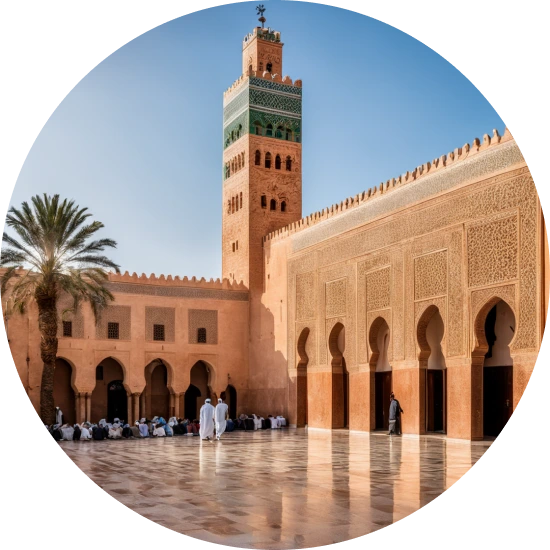The ethnicity distribution for the surname Abdullah also changed during this period as per the Decennial U.S. Census data. The highest percentage of people with this surname identified as Black, though this decreased slightly from 58.22% in 2000 to 51.36% in 2010. The second largest ethnic identity was White, which grew from 16.93% in 2000 to 24.40% in 2010. People of Asian/Pacific Islander descent made up 12.15% of the Abdullahs in 2000 and increased to 13.74% in 2010. Those identifying as Two or more races dropped from 10.45% to 7.28% over the decade. Meanwhile, the proportion of Abdullahs who identified as Hispanic rose from 1.88% to 2.96%, while those identifying as American Indian and Alaskan Native declined from 0.38% to 0.26%.
| 2000 | 2010 | Change | |
|---|---|---|---|
| Black | 58.22% | 51.36% | -11.78% |
| White | 16.93% | 24.4% | 44.12% |
| Asian/Pacific Islander | 12.15% | 13.74% | 13.09% |
| Two or More Races | 10.45% | 7.28% | -30.33% |
| Hispanic | 1.88% | 2.96% | 57.45% |
| American Indian and Alaskan Native | 0.38% | 0.26% | -31.58% |
NomOrigine computes an ancestry breakdown for each customer. People may have ancestry from just one population or they may have ancestry from several populations. The most commonly-observed ancestry found in people with the surname Abdullah is Nigerian, which comprises 11.8% of all ancestry found in people with the surname. The next two most common ancestries are Northern Indian & Pakistani (10.9%) and British & Irish (9.0%). Additional ancestries include Ghanaian, Liberian & Sierra Leonean, Peninsular Arab, Iranian, Caucasian & Mesopotamian, Levantine, and Bengali & Northeast Indian.
Ready to learn more about your ancestry? Get the most comprehensive ancestry breakdown on the market by taking our DNA test.
| ANCESTRY BREAKDOWN | COMPOSITION |
|---|---|
| Nigerian | 11.8% |
| Northern Indian & Pakistani | 10.9% |
| British & Irish | 9.0% |
| Other | 68.3% |

Men carrying the J-M267 lineage took part in many waves of migrations over the millennia, and domesticated animals and plants weren't the only things they carried. They may also have been among the communities that spread the Semitic languages, a diverse group that bloomed from a single proto-Semitic tongue in the Levant nearly 5,750 years ago. These men likely carried branches of both haplogroup J and of the Semitic language family through the Arabian Peninsula to the Horn of Africa. Still later, some J-M267-bearing men re-expanded from the Arabian Peninsula back through the Middle East and across North Africa in migrations associated with the emergence and spread of Islam.
Because it is so dominant in the general European population, haplogroup H also appears quite frequently in the continent's royal houses. Marie Antoinette, an Austrian Hapsburg who married into the French royal family, inherited the haplogroup from her maternal ancestors. So did Prince Philip, Duke of Edinburgh, whose recorded genealogy traces his female line to Bavaria. Scientists also discovered that famed 16th century astronomer Nicolaus Copernicus traced his maternal lineages to haplogroup H.

Chargement de la carte...
Enter the surname you are looking for below:
The last name "Abd al Alim" is of Arabic origin. It is derived from the Arabic words "Abd" meaning "servant of" and "Alim" meaning "knowledgeable." It is a common surname in Arabic...
The last name "Abd al Alime" originates from Arabic and is commonly found in Middle Eastern countries. It typically means "servant of the knowledgeable" or "slave of the learned on...
The last name "Abd al Hafez" is of Arabic origin. It is a combination of the name "Abd" meaning "servant of" and "Hafez" meaning "protector" or "guardian". The name likely originat...
The last name "Abd al Karem" has Arabic origins and it means "servant of the Generous" in English. It is a common surname in Arabic-speaking countries.
The last name "Abd al Majeed" is of Arabic origin. It is a combination of the Arabic words "Abd", meaning "servant" or "worshipper of", and "al Majeed", which is a name derived fro...
The last name Abd al Nasser is of Arabic origin. It is derived from the combination of "Abd" meaning "servant of" and "Nasser" meaning "helper" or "victorious". This is a common su...
The surname Abd al-Samad is of Arabic origin. It is derived from the name of the Islamic prophet Muhammad's father, Abdullah, combined with the name of one of the 99 names of Allah...
The surname "Abd al Sbour" is of Arabic origin. "Abd" means "servant" or "worshipper of", and "Sbour" is a common Arabic surname. It is often used as a part of a longer name to ind...
The last name "Abd al Nour" has Arab origin and translates to "slave of the light" in English.
The surname "Abd al Sattar" is of Arabic origin. "Abd" means "servant of" and "Sattar" means "one who conceals or covers". This name is typically of religious significance and may ...
The last name "Abd alal" is of Arabic origin and typically means "servant of the most high" or "servant of God." It is a common surname in Arabic-speaking countries and is derived ...
The last name "Abd alaziz Mteb" is likely of Arabic origin. The name "Abd alaziz" means "servant of the merciful" and is a common Arabic phrase used as part of a larger name. "Mteb...
The last name Abd Albaki originates from Arabic and is a combination of "Abd" which means "servant of" and "Albaki" which is a personal name. It is likely of Arab origin.
The last name "Abd Albari" is of Arabic origin. It is a combination of the word "Abd" which means "servant" or "worshiper of" and "Albari" which likely refers to a specific charact...
The last name "Abd Alfatah" has Arabic origins. "Abd" means "servant of" and "Alfatah" means "the Opener" or "the Conqueror." It is a common naming convention in Arabic culture to ...